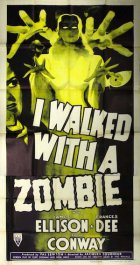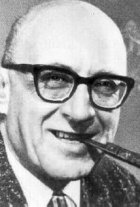
I Walked with a Zombie
- APPROVED
- Year:
- 1943
- 69 min
- 650 Views
The RKO trademark FADES OUT, to reveal a road lined with palm
trees, spectrally long and straight like a vista in a Dali
painting. Along this road and from a far distance two tiny
figures advance toward the camera. Over this scene the TITLE
and CREDITS are SUPERIMPOSED. The two figures continue to
advance, growing more discernible all the time.
As the credits FADE, the two human figures advancing along
the road are more clearly discernible. Although they are not
close enough to distinguish their faces, it can be seen that
one of them is an enormously tall, cadaverous negro, clothed
only by ragged, tight-fitting trousers and that the other is
nurse, dressed in crisp white uniform and cap, with a dark
cloak over her shoulders.
BETSY:
(narrating)
I walked with a zombie.
(laughs a little, self
consciously)
It does seem an odd thing to say.
Had anyone said that to me a year
ago, I'm not at all sure I would
have known what a Zombie was. I
might have had some notion -- that
they were strange and frightening,
and perhaps a little funny. But I
have walked with a Zombie
As she speaks, the two figures advancing on the road come
closer.
BETSY'S VOICE
(narrating)
It all began in such an ordinary
way --
As she says this the long road and the advancing figures
DISSOLVE:
EXT. HOUSES OF PARLIAMENT - OTTAWA - DAY - (STOCK)
The Houses of Parliament seen through falling snow. In the
f.g. horse-drawn sleighs are passing.
BETSY'S VOICE
(narrating)
I'd just finished working on a case
in Ottawa...a little boy who'd
broken both legs. It was one of
those cases with traction frames
and constant care, nicely
complicate with a pair of
hysterical parents. When he was
all well I had to find another job.
That's a nurse's life for you. I
went to the Registry.
EXT. CORNER OF A BUILDING - DAY - (SNOW)
At about the level of the second and third floors is one of
those half-curved, elliptical signboards which lap around the
corners of old-fashioned office buildings. The CAMERA PANS
DOWN this sign, from one firm name to another, stopping at
the last name listed:
PARRISH AND BURDEN SUGAR CO., LTD.
BETSY'S VOICE
(narrating)
They gave me an address in the
business district. I went there.
INT. OFFICE -- DAY
An office on the first floor, with a window opening into a
courtyard. Through this window snow can be seen falling.
CLOSE SHOT of Mr. Richard Brindsley Wilkens, V.C. He is a
small, sharp-featured, precise little man with pincenez
glasses, dressed in a dark business suit. One of the coat
sleeves is empty. The explanation for the missing arm can be
found in his coat lapel: the ribbon of the Victoria Cross.
His age indicates that he won it in the last war. He has a
tablet in front of him and as he speaks, marks down the
answers to his questions.
WILKENS:
You're single?
BETSY:
Yes.
WILKENS:
Where were you trained?
BETSY:
At the Memorial Hospital -- here in
Ottawa.
Wilkens writes this down and then returns the pen to its desk
holder. He picks up a typewritten page from the blotter, and
stares at it.
WILKENS:
(fiddling with the paper
unhappily)
This last question's a little
irregular, Miss Connell. I don't
quite know how to put it.
Wilkens straightens himself determinedly and puts down the
paper.
WILKENS (cont'd)
Do you believe in witchcraft?
Betsy bursts into laughter and we go to our first sight of
her. She is young, bright, alert and looks extremely
attractive in her blue nurse's cape and round fur cape.
BETSY:
(finally putting the leash
on her laughter)
They didn't teach it at Memorial
Hospital. I had my suspicions,
though, about the Directress of
Training.
WILKENS:
(permitting himself a dry
little smile)
Very well. That means that you
have met all Mr. Holland's
requirements. Now, as to salary --
it's quite good -- two hundred
dollars a month.
BETSY:
(pleased)
That is good. But I'd like to know
more about the case.
WILKENS:
I'm afraid I'm not able to tell you
much. Only that the patient is a young
woman -- the wife of a Mr. Paul
Holland with whom we do
considerable business.
BETSY:
That will mean another interview,
won't it?
WILKENS:
No, this is quite final. You see,
Mr. Holland is a sugar planter. He
lives in St. Sebastian Island in
the West Indies.
BETSY:
The West Indies?
WILKENS:
(he's been expecting this)
A year's contract -- a trip with
all expenses paid -- that's not so
bad, you know.
BETSY:
But it's so far away...
WILKENS:
That's rather nice, isn't it?
Wilkens glancing at the snow falling outside the windows.
WILKENS (cont'd)
(a little wistfully)
Sit under a palm tree -- go
swimming -- take sun baths. Just
like a holiday...
BETSY:
Palm trees --
FADE OUT:
FADE IN:
MONTAGE OF SHIPS
A great Canadian luxury liner, a boat like the Empress of
Canada, proceeds across the screen from left to right.
Another ship, a smaller passenger steamer, going in the same
direction, takes her place as she DISSOLVES OFF; then a
freighter, and finally a small white-hulled trading schooner
comes onto the screen.
BETSY'S VOICE
(narrating)
Boats grow smaller to reach out-of
the-way ports. Judging by the
boats that took me to St. Sebastian
-- it's far away and hard to get
to. First, there was the great
liner to Havana -- then a smaller
steamer to Port au Prince -- a
freighter to Gonave -- and from
Gonave, one of the little island
trading schooners that carry sugar
and sisal, sponges and salt all
over the Caribbean.
DISSOLVE:
A SAIL -- NIGHT
A gaff-headed sail against a night sky of stars. The boat
carrying the sail is evidently in a rolling sea. The sail
moves in rhythmic undulance against the sky. We hear the
chug-chug of a one-cylinder Diesel.
EXT. SCHOONER -- WHEEL -- NIGHT
Two men stand by the wheel of the schooner, their faces lit
by the light from the binnacle. Behind them the wake of the
boat creams out, white and phosphorescent. One of the men is
obviously the skipper of the boat, dressed in sloppy white
ducks, unshaven and with an officer's battered cap on his
head. The other is a slim, tall man dressed in flannel
slacks and a light tweed coat.
BETSY'S VOICE
(narrating)
The man for whom I'd come to work --
Mr. Holland -- boarded the schooner
at Gonave. He was pointed out to
me, and he must have known who I
was -- yet he never spoke to me.
Sometimes I wondered how we'd get
on -- but there wasn't really time
for to think about it -- there was
so much to see. I loved the trip.
EXT. SCHOONER -- OPEN GALLEY ON DECK -- NIGHT
Near the mainmast is a large box filled with sand and on this
sand a charcoal fire has been laid. A negro, dressed in
dungarees, is cooking a large piece of meat. Other negroes
lounge on deck, their black faces fire-lit.
They are singing, and their singing is attuned to the rhythm
of the chugging motor.
EXT. OCEAN -- NIGHT -- (STOCK)
The wake of the schooner.
EXT. OCEAN -- FLYING FISH -- NIGHT -- (STOCK)
Translation
Translate and read this script in other languages:
Select another language:
- - Select -
- 简体中文 (Chinese - Simplified)
- 繁體中文 (Chinese - Traditional)
- Español (Spanish)
- Esperanto (Esperanto)
- 日本語 (Japanese)
- Português (Portuguese)
- Deutsch (German)
- العربية (Arabic)
- Français (French)
- Русский (Russian)
- ಕನ್ನಡ (Kannada)
- 한국어 (Korean)
- עברית (Hebrew)
- Gaeilge (Irish)
- Українська (Ukrainian)
- اردو (Urdu)
- Magyar (Hungarian)
- मानक हिन्दी (Hindi)
- Indonesia (Indonesian)
- Italiano (Italian)
- தமிழ் (Tamil)
- Türkçe (Turkish)
- తెలుగు (Telugu)
- ภาษาไทย (Thai)
- Tiếng Việt (Vietnamese)
- Čeština (Czech)
- Polski (Polish)
- Bahasa Indonesia (Indonesian)
- Românește (Romanian)
- Nederlands (Dutch)
- Ελληνικά (Greek)
- Latinum (Latin)
- Svenska (Swedish)
- Dansk (Danish)
- Suomi (Finnish)
- فارسی (Persian)
- ייִדיש (Yiddish)
- հայերեն (Armenian)
- Norsk (Norwegian)
- English (English)
Citation
Use the citation below to add this screenplay to your bibliography:
Style:MLAChicagoAPA
"I Walked with a Zombie" Scripts.com. STANDS4 LLC, 2025. Web. 22 Feb. 2025. <https://www.scripts.com/script/i_walked_with_a_zombie_875>.







Discuss this script with the community:
Report Comment
We're doing our best to make sure our content is useful, accurate and safe.
If by any chance you spot an inappropriate comment while navigating through our website please use this form to let us know, and we'll take care of it shortly.
Attachment
You need to be logged in to favorite.
Log In